At first thought, deciding upon the best hitch for a travel trailer may seem like a simple, straightforward job that requires little decision-making. For the most part, mulling over the best trailer hitch really is quite simple. The problem is there may be subtle nuances involved that you are unaware of.
We happen to know a thing or two about trailers and hitches, and this article will reveal a few essential considerations.
A common misconception about selecting the best trailer hitch for your vehicle is that any old hitch will do the job – but that simply isn’t the case. You must choose one that matches your towing requirements and vehicle specifications.
Ultimately, different types of hitches are suited to specific tasks, from towing a car trailer to hauling equipment and everything in between. Ensuring you have the right hitch improves safety, keeps your vehicle nicely balanced, and helps you maintain control on the road.
This guide will cover the essentials of choosing a trailer hitch, covering the best hitch for travel trailers, heavier loads, and general day-to-day towing. Throughout it, we shall discuss the various hitch types, classes, and other key factors.
In terms of choosing the best hitch for towing, the first step is to understand the main types available. Different hitches offer various advantages based on your vehicle, the type of trailer you plan on towing, and (importantly) the load size. If you have ever noticed a trailer sweating precariously from side to side on a highway, the chances are pretty good that the driver has not considered these factors.
To that end, let’s look at the main types of hitches and explain which may be the best trailer hitch for you.
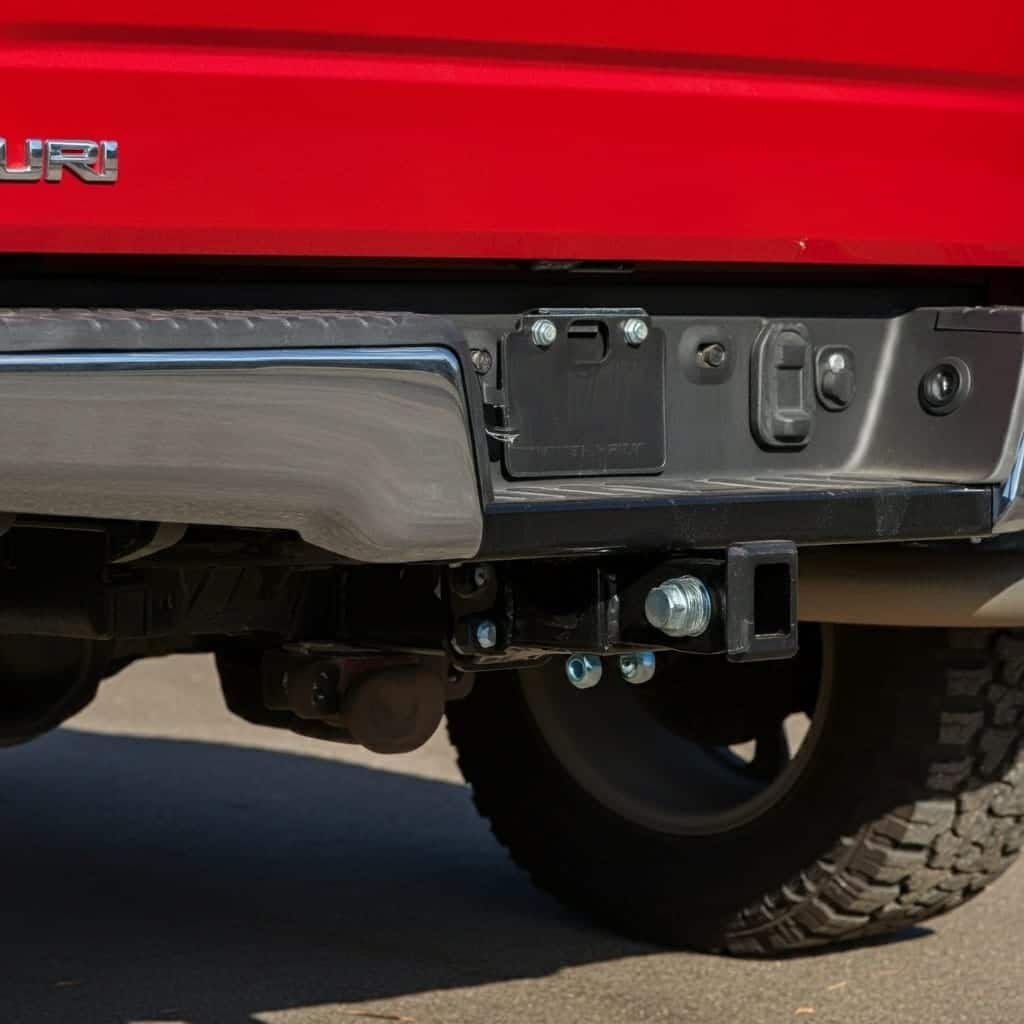
Probably the most commonly used option, a receiver hitch is known for its compatibility with a huge range of vehicles. This type of hitch features a bulky, square tube that fits accessories, including (but not limited to) ball mounts, cargo carriers, and bike racks.
Receiver hitches are available in multiple classes – from Class I to Class V – each designed to handle specific weight ranges. For general daily towing, a receiver hitch is usually the best trailer hitch to use, as it can be installed on most SUVs, trucks, and vans quite easily. Generally speaking, this is the best trailer hitch for travel trailers and medium towing.
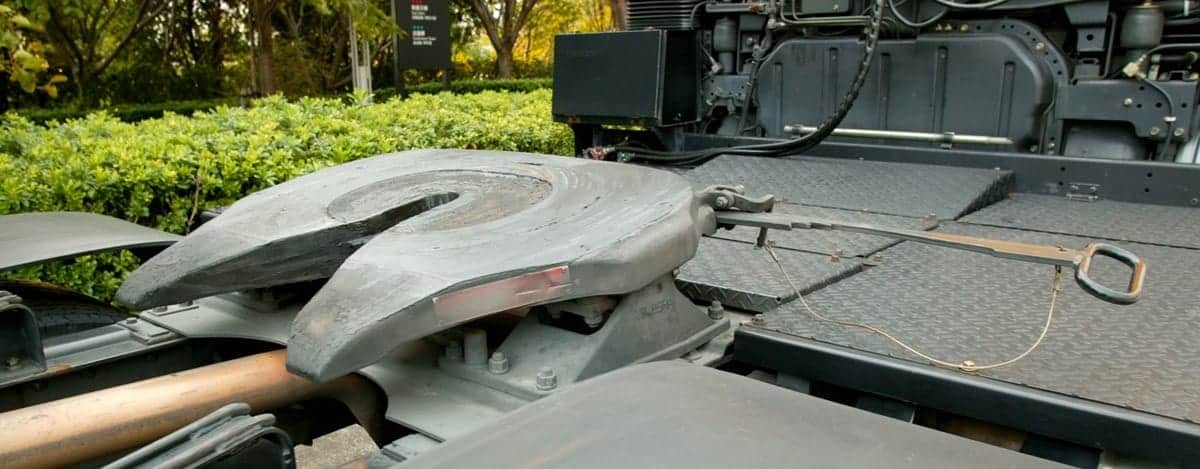
Usually designed for heavier towing, fifth-wheel hitches mount directly into the truck bed and provide added stability for larger trailers. This type of setup is common for towing larger trailers, such as RVs and semi-trailers, as it positions the hitch over the truck’s rear axle, ensuring a more balanced, central load.
Fifth-wheel hitches use a specialized ‘kingpin and jaw’ connection, which allows smooth movement and much greater control. This hitch type is ideal if you’re searching for the best hitch for towing travel trailers, as it affords dependable stability even on winding, twisting roads (great for reversing, also).
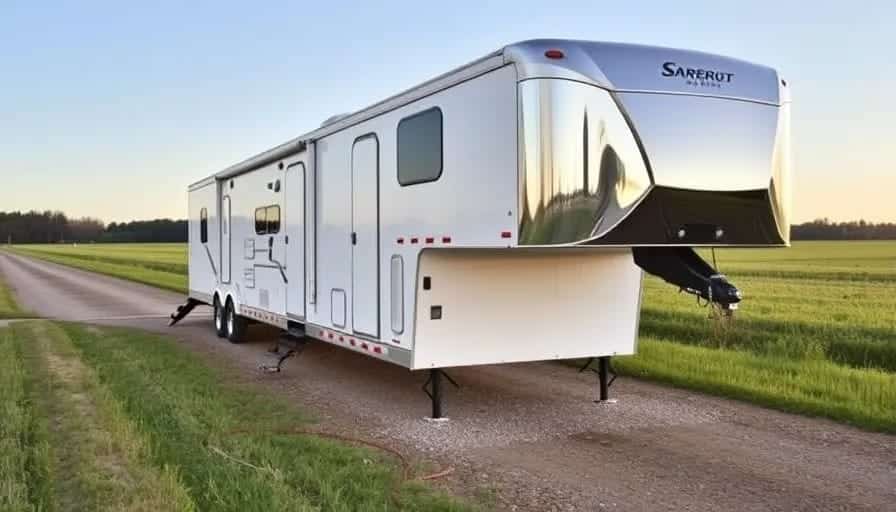
A gooseneck hitch, similar to the fifth wheel, also mounts in the truck bed but uses a unique ball-and-coupler type of connection rather than a kingpin.
This is often seen as the best hitch for towing large travel trailers or heavy loads like livestock and flatbed trailers. One notable benefit of gooseneck hitches is their tighter turning radius, which greatly improves maneuverability.
If your towing requirements include hauling particularly heavy or oversized loads, a gooseneck hitch is likely the best trailer hitch for your requirements. However, it’s important to ensure your truck can accommodate this hitch style, as not all vehicles are compatible.
Choosing the best trailer hitch depends on various factors, like load size and your vehicle’s towing capabilities. With a range of options, such as receiver, fifth-wheel, and gooseneck, you can easily select the type that best suits your towing needs
Before deciding on the best trailer hitch, a second aspect needs to be considered: the various classes involved. The classes range from Class I to Class V and define the hitch’s weight capacity and functionality.
Let’s break each one down:
Class I: These light-duty hitches are designed for compact and mid-size cars, perfect for small trailers and bike racks. With a towing capacity of up to 2,000 pounds, they are great for lighter loads and easy to handle.
Class II: Boasting a bit more strength, Class II hitches are better for sedans, small SUVs (with emphasis on small), and minivans. They can tow up to 3,500 pounds and are a common choice for small boats or utility trailers.
Class III: This versatile category is typically the best hitch for towing travel trailers or larger utility trailers. With a hefty towing capacity of up to 8,000 pounds, this is usually the best trailer hitch for trucks, larger SUVs, and commercial vans.
Class IV: Built for heavy-duty towing, Class IV hitches can handle up to 10,000 pounds. With such a dependable capacity, they are a great option for towing large campers or heavy industrial equipment. You might see them on full-size trucks and large SUVs quite commonly.
Class V: Moving onto the ‘big hitters of the hitch world,’ Class V are the best trailer hitch receivers for extreme loads, with capacities exceeding a staggering 20,000 pounds. Most commonly used for commercial purposes, Class V hitches are commonly found on heavy-duty trucks and are the default for hauling heavy commercial trailers.
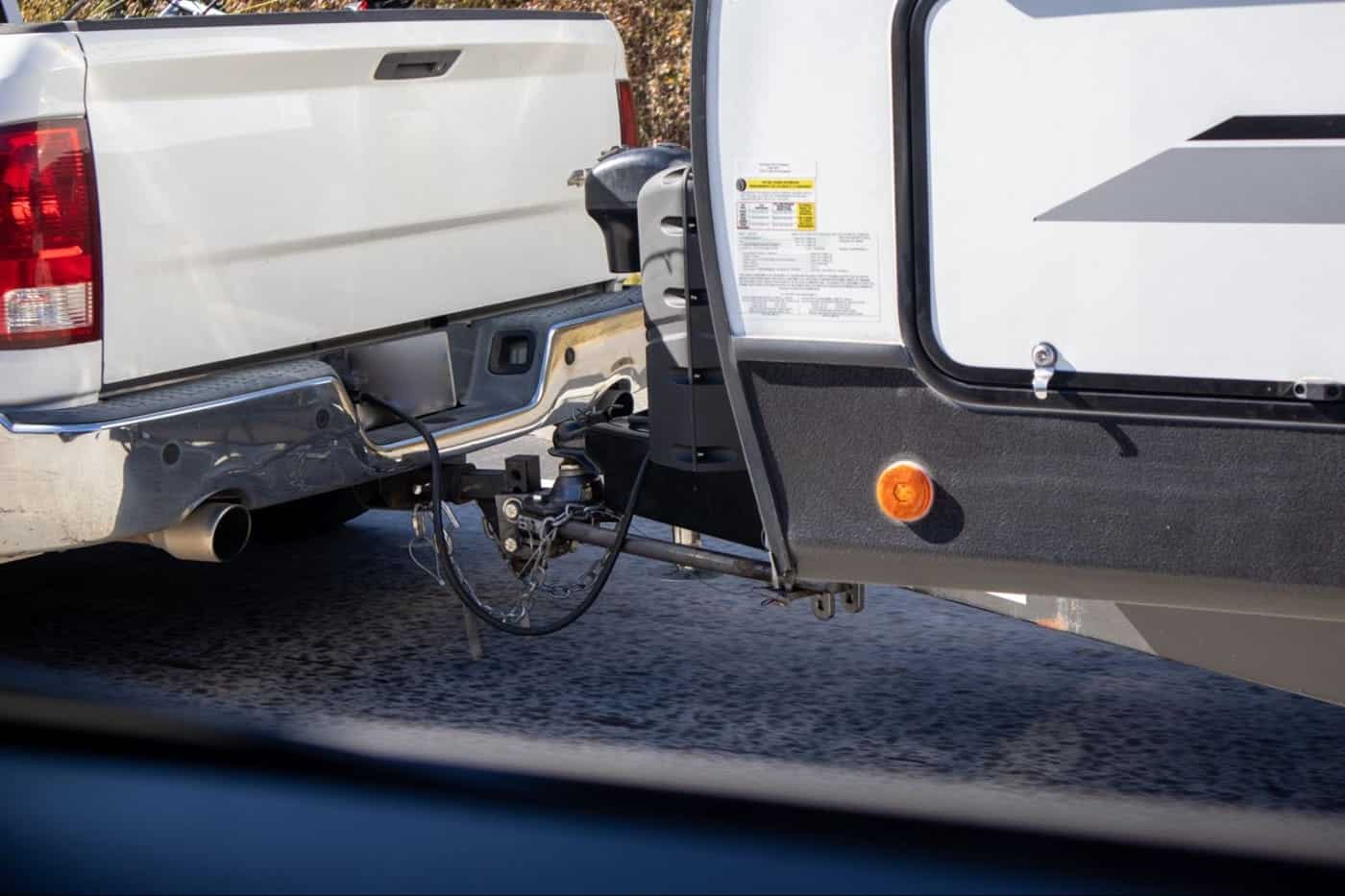
So, at this point in the guide – with hitch types and class types covered – you may consider yourself fully educated on the best hitch for towing. However, there are a few other considerations to be mindful of if you wish to be fully conversant in all things related to trailer hitches.
Let’s take a look, starting with a few additional fundamentals.
Selecting the best trailer hitch requires careful evaluation of your vehicle, the load you plan to tow, and your long-term towing needs. Let’s break down the key considerations to help you make the right choice.
Knowing your vehicle’s towing capacity is the next step in finding the best trailer hitch for travel trailer towing (or any other purpose). Overloading your vehicle with too much weight is something best avoided, as it can lead to reduced performance, mechanical damage, and safety issues.
Finding your vehicle’s towing capacity is simple enough; just look in the owner’s manual. If you don’t have a manual available, simply reach out to the manufacturer. Armed with this information, you can then ensure the hitch you choose matches this capacity to provide a secure connection while towing.
Again, not all hitches fit every vehicle, so you’ll need one designed specifically for your car, SUV, or truck. For example, smaller vehicles typically use Class I or II hitches, while heavy-duty trucks probably require a Class IV or V hitch.
Either way, the best hitch for towing will depend on its compatibility with your vehicle’s frame and factory specifications. Many manufacturers now offer hitch compatibility guides to make this step a little easier.
Pro Tip: Always double-check your trailer hitch connections before every trip. A quick inspection can prevent accidents and ensure a safe towing experience on the road.
Next, we must ponder the question: what kind of load are you planning to tow? This answer greatly influences the hitch you need. For example, the best hitch for towing travel trailer setup often includes a Class III or IV hitch with additional features like weight distribution systems (to stabilize larger loads).
Then again, if you’re towing lighter items like bike racks or utility trailers, a Class I or II hitch will usually do the trick. Always consider the weight and size of your load when deciding what kind of hitch you need.
Hitch costs vary based on type, class, and additional features. A basic Class I hitch may cost as little as $100, while a Class V hitch designed for heavy loads can run upwards of $500. Installation costs may also add $200–$500, depending on your vehicle and the general complexity of the setup.
While price is an important factor, remember that a lower-cost hitch may not meet all your needs. Investing in a durable, high-quality trailer and hitch upfront will pay for itself over time.
The notion of durability should never be overlooked when choosing the best trailer hitch receiver. With that in mind, look for products made from high-strength materials like steel or aluminum with protective coatings to resist corrosion.
Good trailer retailers often offer trailer warranties (or at least, they should), which should provide added peace of mind. Ultimately, a well-constructed hitch not only affords a safe towing experience but also increases its lifespan, making it a much better investment over time.
Take the time to consider these factors, and you will confidently select the best trailer hitch for your vehicle and towing requirements. That could mean hauling a basic camper, industrial equipment, or everyday cargo; regardless of your goals, a balanced, considered decision ensures safe and secure towing every time.
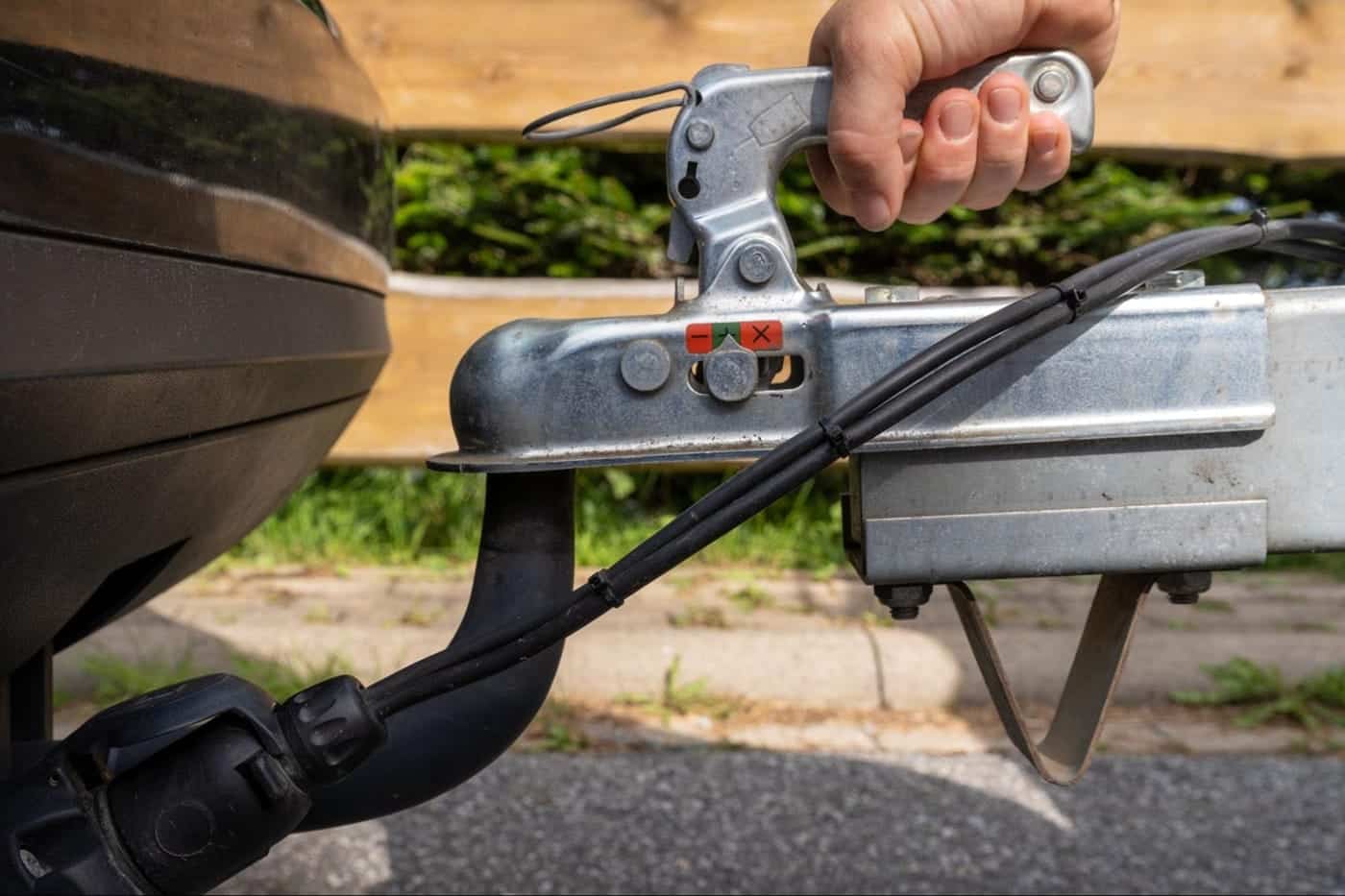
Investing in the right accessories is always a wise move to improve towing performance and general safety. These additions can make a big difference, especially for anyone hoping for the best hitch for towing travel trailer setups.
Here’s a look at some popular options:
Anti-sway devices are quite simple in design and usually affordable. They help keep your trailer stable by reducing panic-inducing side-to-side movement caused by wind, uneven roads, or sudden maneuvers. They are a valuable (if not essential) addition to travel trailers, setting you up for a smoother and safer towing experience.
Another essential for many people, adjustable ball mounts allow you to fine-tune the height of your hitch ball to match the trailer’s coupler more precisely. This basic feature is really helpful if you tow different trailers with varying degrees of height. However, it is probably not worth the small investment if you only use one trailer.
Hitch covers protect your hitch receiver from dirt and debris when not in use, while hitch locks add an extra layer of security to prevent theft of your trailer or hitch components. Not particularly vital, but worth having, nevertheless.
Similar to anti-sway devices, a weight distribution system helps evenly distribute the weight between your vehicle and the trailer. This improves stability with heavy loads and prevents excessive strain on the hitch and towing vehicle.
With our flexible financing options, good-quality trailers are more attainable than you might think.
Safety should always be a prerequisite when towing any vehicle. Proper braking systems and safety devices are especially vital for large trailers and heavy loads. Whether you’re using the best hitch for towing a small trailer or a heavier option, you might wish to consider these essential systems:
Many states these days require trailers exceeding certain weight limits to have their own braking systems. These systems aim to reduce the strain on your vehicle’s brakes and inject a little extra stopping power. Common options currently include electric brakes and surge brakes, both of which can be easily controlled by the towing vehicle.
Safety chains provide a failsafe connection between your vehicle and trailer – the trailer then remains attached if the hitch fails in some way. However, always cross the chains under the tongue of the trailer for that added layer security.
Anti-sway bars reduce the risk of fishtailing, a common (and quite terrifying) problem with larger trailers. They keep the trailer aligned with the vehicle, making it safer to handle at higher speeds or in windy conditions. In reality, fishtailing is quite a rare event, but given the affordable cost of anti-sway bars, they are a wise investment.
Always be aware of state-specific laws regarding trailer braking systems and safety requirements. Checking local regulations might be a chore, but it ensures that your towing setup complies with legal standards.
At this point, we can wrap things up. You are now ready to select the best hitch for towing a travel trailer or, indeed, any type of trailer.
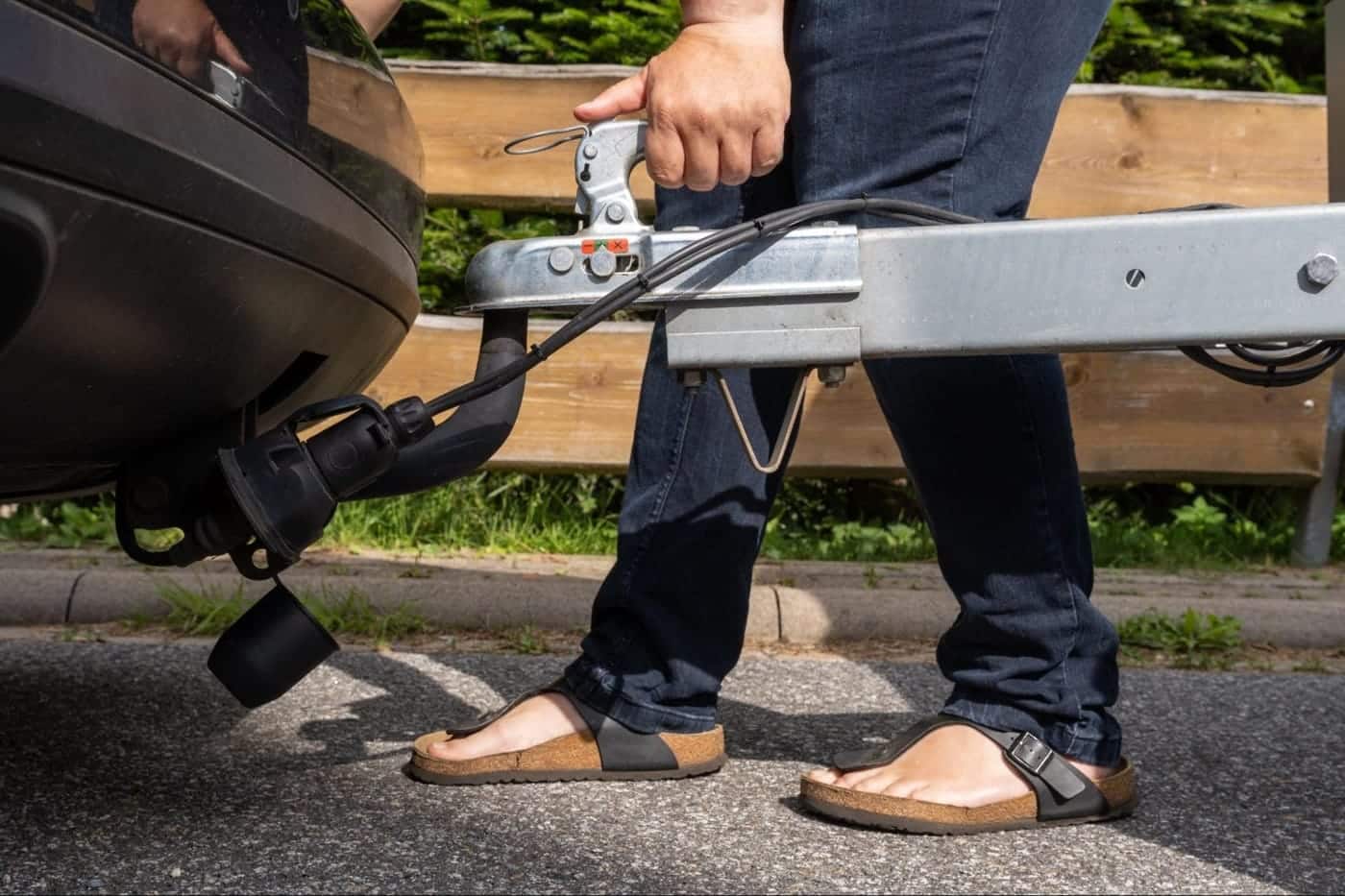
There are just a few more caveats we should address, so let’s do that below: start with where you decide to buy your trailer hitch.
There is little point in taking the time, effort, and energy to select the best trailer hitch or, indeed, the best trailer hitch receiver if you proceed to purchase poor-quality products from a dealer of ill repute.
Given the abundance of online options these days, with products hailing from countries that fail to adhere to quality control standards, choosing the right dealer is as important as selecting the best trailer hitch.
A trusted dealer like Millennium Trailers ensures high-quality products, friendly, knowledgeable support, and long-term reliability you can count on. Our wide selection and expert team make it far easier to find exactly what kind of trailer hitch you need, giving you extreme confidence in your towing setup.
Essentially, selecting the best trailer hitch isn’t a complicated endeavor. It really depends on your vehicle type, towing capacity, and specific hauling needs. Nothing more, nothing less.
It’s simple, really. By matching your hitch to your trailer, you can tow safely and securely. Either way, a properly chosen hitch not only improves safety but also allows a decent towing experience for years to come.
Millennium Trailers has the perfect trailer waiting for you – our team is passionate about finding the right fit for your needs and budget.
At Millenium Trailers, you can expect:
Explore our trailer selection online, or give us a call to discuss your dream trailer!
https://www.trucktrailer.org/store/ListProducts.aspx?catid=380765
Millennium Trailers is your trusted partner for high-quality trailers at unbeatable prices. Serving all 50 states, we’ve delivered over 5,000 trailers nationwide.
Established in 1998, we’re a company dedicated to meeting your hauling needs with excellence. Whether it’s cargo trailers or custom living quarters, we provide a wide range of options to suit your requirements. Our knowledgeable and friendly team ensures a smooth buying experience with personalized assistance. Proudly offering competitive pricing, state-of-the-art designs, and easy financing options. Committed to customer satisfaction, we strive to simplify the process of finding your perfect trailer.
Choose Millennium Trailers for a reliable, customized solution that delivers quality and value for your investment.
Copyright 1998 – 2023 Millennium Trailers, Inc.